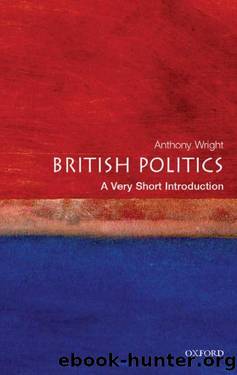British politics: a very short introduction by Anthony Wright

Author:Anthony Wright [Wright, Anthony]
Language: eng
Format: epub
Tags: General, Europe, History, Great Britain, 20th century, Political Science, History & Theory, History & Theory - General, Politics & government, Current Events, International Relations, Politics, Current Affairs & Issues, Politics and government, Political Process, English law: government powers, Politics; Practical - Great Britain, Political History, Politics; Practical, England, Great Britain - Politics and government - 20th century, Government powers, Wales
ISBN: 9780192854599
Publisher: Oxford University Press
Published: 2003-06-29T22:00:00+00:00
Chapter 5
Representing: party
rules OK
Parties eat good men and spit them out bad . . . No nationâs public life is so polluted by party as Britainâs.
(Simon Jenkins, The Times, 14 October 1998) At the 1997 general election one of the candidates in my constituency was an unknown local gentleman by the name of Mr Hurley. He described himself on the ballot paper as the âNew Labourâ candidate. This was confusing enough, but it became even more confusing on polling day when someone called the Labour Party campaign HQ to point out that our loudspeaker cars seemed to be urging people to âVote Labour, Vote Hurleyâ (it was really âearlyâ
of course). In the event Mr Hurley managed to win well over a thousand votes, without doing anything at all, and knocked a slice off the Labour majority. At the count he declared himself to be one of my supporters, but this did nothing to assuage my damaged majority.
This story has one lesson and one consequence. The lesson is that if you want to win votes in Britain, at least in general elections, then you had better get a party (even if this means a bogus borrowing of someone elseâs party). The occasional and isolated exceptions (one in each of the 1997 and 2001 Parliaments) only prove the rule. 64
Elected politicians have a wonderful capacity for persuading themselves that their electoral success is to be explained by their obvious personal qualities, but the evidence is all against them. Overwhelmingly, it is the party label that counts. British politics is party politics.
Now the consequence, which has a larger significance. Following the 1997 election, legislation was introduced (Registration of Political Parties Act 1998) to enable parties to register their title to their name, and to similar names that might confuse the voters. This was designed to see off Mr Hurley and his like (of which there had been many, including a âLiteral Democratâ). The significance of this legislation was not what it contained, which was relatively minor, but the fact that legislation on political parties had been introduced at all. This was a major constitutional departure. The role of political parties was the other big truth of British politics, R
along with strong government, but it was a truth that had hitherto epresenting
not dared to speak its name. Apart from some small housekeeping provisions, the existence of political parties was a closely guarded constitutional secret. This was like describing a car without mentioning that it had an engine.
It was not until 1969 that party names were even allowed to appear on ballot papers, finally exploding the fiction that it was individuals rather than parties who were being voted for. In the House of Commons the fiction is still maintained by the absence of any party designation in the way that MPs are formally described. They are simply the âHonourable Memberâ for a particular constituency. The real business is done through a mysterious device known as the
âusual channelsâ, curiously absent from the textbooks, where the party
Download
This site does not store any files on its server. We only index and link to content provided by other sites. Please contact the content providers to delete copyright contents if any and email us, we'll remove relevant links or contents immediately.
| Africa | Americas |
| Arctic & Antarctica | Asia |
| Australia & Oceania | Europe |
| Middle East | Russia |
| United States | World |
| Ancient Civilizations | Military |
| Historical Study & Educational Resources |
Machine Learning at Scale with H2O by Gregory Keys | David Whiting(4287)
Never by Ken Follett(3924)
Fairy Tale by Stephen King(3361)
Oathbringer (The Stormlight Archive, Book 3) by Brandon Sanderson(3118)
The Man Who Died Twice by Richard Osman(3057)
Will by Will Smith(2894)
Rationality by Steven Pinker(2345)
Can't Hurt Me: Master Your Mind and Defy the Odds - Clean Edition by David Goggins(2316)
The Dark Hours by Michael Connelly(2297)
Friends, Lovers, and the Big Terrible Thing by Matthew Perry(2210)
The Dawn of Everything: A New History of Humanity by David Graeber & David Wengrow(2185)
Principles for Dealing With the Changing World Order: Why Nations Succeed and Fail by Ray Dalio(2028)
HBR's 10 Must Reads 2022 by Harvard Business Review(1831)
A Short History of War by Jeremy Black(1829)
Go Tell the Bees That I Am Gone by Diana Gabaldon(1745)
A Game of Thrones (The Illustrated Edition) by George R. R. Martin(1702)
515945210 by Unknown(1659)
Kingdom of Ash by Maas Sarah J(1655)
443319537 by Unknown(1540)
